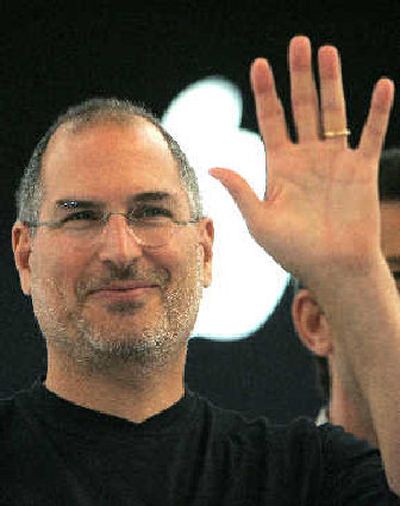Jobs blasts music firms

PARIS — Apple boss Steve Jobs vowed Tuesday to repel “greedy” record companies’ demands for higher music download prices, warning that any such move would encourage piracy.
Jobs, speaking before the opening of the Apple Expo in Paris, said some music majors were pushing for an increase in prices on Apple’s online iTunes Music Store.
Apple’s co-founder and CEO said record companies already earn more profit from songs sold through iTunes — cutting out costs of manufacturing, marketing and returns — than from those sold on CD.
“So if they want to raise the prices it just means they’re getting a little greedy,” he said.
As their contracts with Apple come up for renewal, music companies are seeking to improve their take from sales through the U.S. iTunes site, which charges 99 cents per song. Prices are typically higher in Europe, Japan and other regions.
Cupertino, California-based Apple Computer Inc. launched its Japanese iTunes site in August without Sony BMG’s music catalogue, as negotiations dragged on.
Observers say the same issues are likely to surface in talks between the two companies on their U.S. sales, and Warner Music Group Corp. is also reportedly seeking price increases.
Warner Music and Universal Music Group declined to comment. Sony BMG and EMI Group PLC did not return calls.
Jobs indicated he plans to stand firm. “Customers think the price is really good where it is,” he said.
“We’re trying to compete with piracy, we’re trying to pull people away from piracy and say, ‘You can buy these songs legally for a fair price,”’ he added.
“But if the price goes up a lot, they’ll go back to piracy. Then everybody loses.”
Industry analyst Philip Leigh, who runs U.S. market research firm Inside Digital Media, said record companies were smarting over their loss of control as online customers cherry-pick favorite hits.
“A full CD might have only three or four popular songs,” Leigh said. “Now that the consumer’s able to buy each song individually, they don’t have to buy the whole CD, and the labels are concerned that this will result in lower revenues.”
But as long as Apple controls the market for music players and paid-for downloads, Leigh said, “it’s going to be very difficult for the labels to avoid dealing with Steve Jobs on his terms.”
Apple’s iTunes accounts for 82 percent of legal downloads in the United States. The company has sold more than 500 million songs online and about 22 million iPod digital music players.